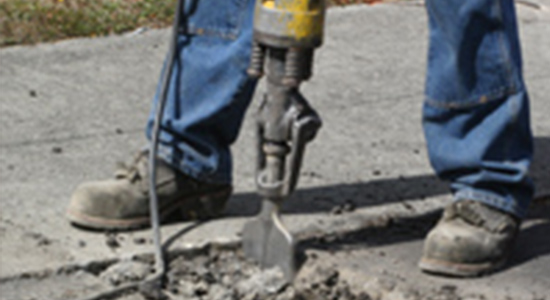Who is at risk of HAVS?
Hand-arm Vibration Syndrome (HAVS) is a workplace disease that causes pain and damage in fingers, hands and arms. The main causes are prolonged use of power tools and operating heavy machinery.
So, who is at risk?
That will depend on the type of equipment you are using and for how long each day. Are there any simple guidelines on this? Yes, there is also a regulation that determines the exposure levels. The Control of Vibration at Work Regulations 2005 set the parameters. Can you tell us the parameters? Well I could but it talks about exposure limits and weighting figures, so I don’t want to bore you with that, but you can refer to the HSE guide ‘Hand-arm Vibration at Work - A brief guide INDG 175’ for the information.
However, there is a quick solution that will indicate whether your employees are at risk. Oh, I like simple, please continue. We can employ the specialist knowledge of qualified occupational health providers, aren’t these expensive? Not really, but if you don’t employ them and ignore the issue, then the fines you may face will be considerably higher than their costs, if your employee is diagnosed with HAVS.
Remember this is something you should do to help you control the risks to your employees, don’t forget to risk assess the tasks and decide how you will reduce the potential effects of vibration related illnesses first.
Occupational Health Specialists will provide you with health surveillance, your legal obligation when your employees are exposed to levels that are at or above the exposure values and will therefore test your employees following a four-tier process.
- 1: Assessment before undertaking employment: This gives a baseline and helps identify employees who may already have HAVS issues that need to be dealt with.
- 2: This is carried out annually and involves the employee completing a self-assessment questionnaire. Any concerns that someone is suffering from HAVS will be referred for a clinical examination. If no concerns are raised then tier 3 will not be required, but you must monitor your work processes to ensure the issue does not manifest later.
- 3: Clinical examination: If HAVS is suspected, the clinical tests are carried out by a specially qualified OH nurse and will include testing for grip strength – if the results show symptoms of HAVS they will be referred to a specialist doctor.
- 4: Making a formal diagnosis: This is carried out by an occupational health doctor, often using standardised tests, an assessment is then made concerning the employee’s fitness to carry out their duties and whether restrictions should be introduced.
So, if they suggest that the employee is not fit to continue working with the tools, what do I do?
This will depend on the detail of the report and can follow different routes including; the provision of light duties and whether it’s considered a disability under the Equality Act 2010. If it is there is an obligation to make ‘reasonable adjustments’.
There are also issues of capability and if deemed a suitable argument, an employee can potentially be dismissed from their role. However, do not assume that all cases can result in dismissal. The process of dismissing an employee on the grounds of capability can be long and drawn out. It is pertinent also as part of that process that the advice of a medical professional is sought in advance of any consideration of terminating the employment. The advice of a good HR professional will walk you through the process. Also, to note, that if you were the proven to be the cause of the employee’s disability, then you could face prosecution for health and safety offences.
If you are seeking help for a health and safety or HR issue, please contact us.






